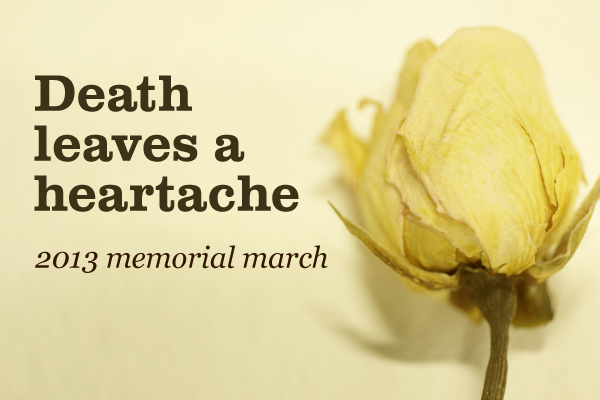
“Death leaves a heartache.”
Those were the words on a card that Jennifer Chieh Ho, the UNE’s Regional Vice-President for B.C. and Yukon, received during last week’s Memorial March.
While countless Canadians were putting final touches on their Valentine’s Day plans, many others took to the streets to honour our country’s missing and murdered women. The first Memorial March took place 22 years ago in Vancouver’s downtown eastside.
Over the past decade, these marches have started taking place in many cities across Canada.
Kristin Gilchrist, a co-founder of Families of Sisters in Spirit and a doctoral student at Carleton University’s department of sociology, says these marches have grown considerably thanks to the important work of countless grassroots organizations.
“They draw critical awareness to the violence happening in our communities, especially violence directed at Indigenous women,” wrote Gilchrist.
Chieh Ho and a few members of her Local attended this year’s march where it all started: in Vancouver’s downtown eastside. She said she was especially happy to see such a diverse group of allies demonstrating for this important cause.
“There were many aboriginal brothers and sisters, but there were also a very encouraging number of men and women of all nationalities, of all ages, who came to support,” she remarked.
“The march took us to a number of spots where women were found murdered or were last seen before they went missing,” said Chieh Ho. “We took a moment at each spot to honour each woman.”
Chieh Ho said that a rose was left to mark each spot: a red rose for women found murdered – a yellow rose for women who have gone missing.
“I was a bit shocked and saddened by the number of times we stopped,” she added.
The Native Women’s Association of Canada has a list of more than 500 confirmed cases of missing and murdered native women – and those are just the ones they can actually confirm.
Gilchrist says that Indigenous women face many barriers when it comes to being heard.
“Barriers are especially apparent when there’s a failure by allies to make connections between anti-violence, anti-colonialism, and settler responsibility,” wrote Gilchrist.
She says Indigenous women’s voices are often included only as an afterthought or silenced altogether. And it’s not at all uncommon for those running their own agenda to simply expect these women to go along with their plans.
“These things happen far too often,” she added.
The Harper government continues to brush off demands for a public inquiry into missing and murdered aboriginal women.
As Jennifer Lord of the Native Women’s Association of Canada told us last year: “This is what the families want.”
There are many photos of the march on Flickr.